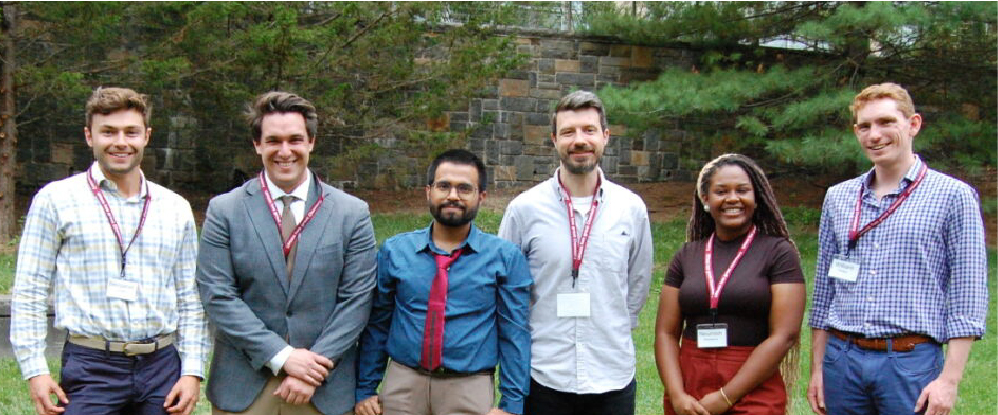Neumiah Massenat and Nick Baker Finish Candidacy Exams!
December 2024
Nick and Neumiah have both successfully completed their final exam to obtain candidacy, the original reserch proposal (ORP).



We are a team of scientists committed to understanding how the shape, size, and chemical composition of nanoscale materials influence their catalytic properties. Inspired by the natural nutrient cycles of our planet, our dream is to develop catalysts capable of transforming common pollutants back into useful chemicals to eventually support our modern society in a sustainable manner. To that end, we synthesize a variety of catalytic nanomaterials and study their reaction mechanisms with spectroscopic techniques to elucidate the factors that govern reaction selectivity. Those interested in joining our team should email Joe (jduchene@umass.edu) for more information.
Nick and Neumiah have both successfully completed their final exam to obtain candidacy, the original reserch proposal (ORP).
The UMass Chemistry Department has chosen to award Will Phillips and Ben Adams fellowships for their outstanding work! Will Phillips was awarded the PPG Fellowship and Ben Adams was award the Donald Kuhn Fellowship.
We are very excited to announce that Neumiah Massenat, a 2nd year graduate student in the DuChene lab, has recently been awarded the prestigious Graduate Research Fellowship from the National Science Foundation for her proposal entitled, “Investigating the Electrochemical Nucleation and Growth of Shaped-Controlled Copper Nanoparticles for Electrocatalysis Applications.” Neumiah’s research will lay the foundation towards the development of new techniques for electrochemical synthesis of shape-controlled nanoparticles, with eventual applications in electrocatalysis. We are all very proud of Neumiah and we are grateful for the financial support from the NSF.
The chemistry department hosts an annual research symposium, ResearchFest to start off the Fall semester. The symposium is a culmination of the prior years work where selected senior graduate students present their work and the rest of the department present posters. This year Nick Baker took home the first poster prize for the DuChene Lab in the People's Choice poster. This prize is selected by the incoming class of graduate students in the department. Congratulations Nick!
Neumiah Massenat and Nicholas Baker have joined our lab! We are excited to see what they bring to the team!
Although heterogeneous catalysts play an important role in our chemical industry, most industrial catalysts operate under conditions that rely on extreme heat and/or pressure to perform their functions. We seek to create catalysts that can harness renewable sources of energy to drive chemical reactions near ambient conditions to achieve sustainable processes. We synthesize electrocatalysts capable of using electricity generated from renewable sources such as wind or solar, as well as photocatalysts capable of directly harvesting sunlight for driving chemical transformations. The efficient use of these two distinct sources of energy (electricity vs. sunlight) requires different materials that can harness these energy inputs to catalyze chemical reactions. We are currently focused on the reduction of carbon dioxide back into hydrocarbons like ethanol and/or ethylene, the reduction of nitrate back into ammonia, and the overall splitting of water into hydrogen and oxygen gas.
We develop methods for the shape-controlled synthesis of catalytic nanostructures, which provides tremendous flexibility for tuning the catalytic properties of our materials by manipulating their shape, size, and chemical composition. We have expertise in the synthesis of a variety of metals and semiconductors for applications in electrocatalysis and photoelectrochemistry. We are continually developing new techniques while also refining our current methods to provide exquisite control over material properties at the nanoscale.
The development of catalysts capable of controlling reaction selectivity requires detailed knowledge of how the material properties govern the reaction mechanism. As such, we develop spectroscopic platforms that allow us to identify and monitor reaction intermediates on working catalytic systems with in situ vibrational spectroscopy. We also use electron paramagnetic resonance spectroscopy and/or Raman spectroscopy to identify the oxidation states of the active catalyst. When combined with extensive materials characterization, these spectroscopic studies provide valuable insight into how the material properties of the catalyst influences its activity and selectivity for a given reaction of interest. With this knowledge, we hope to eventually create catalytic nanomaterials with electronic structures that are specifically tailored for a particular reaction.